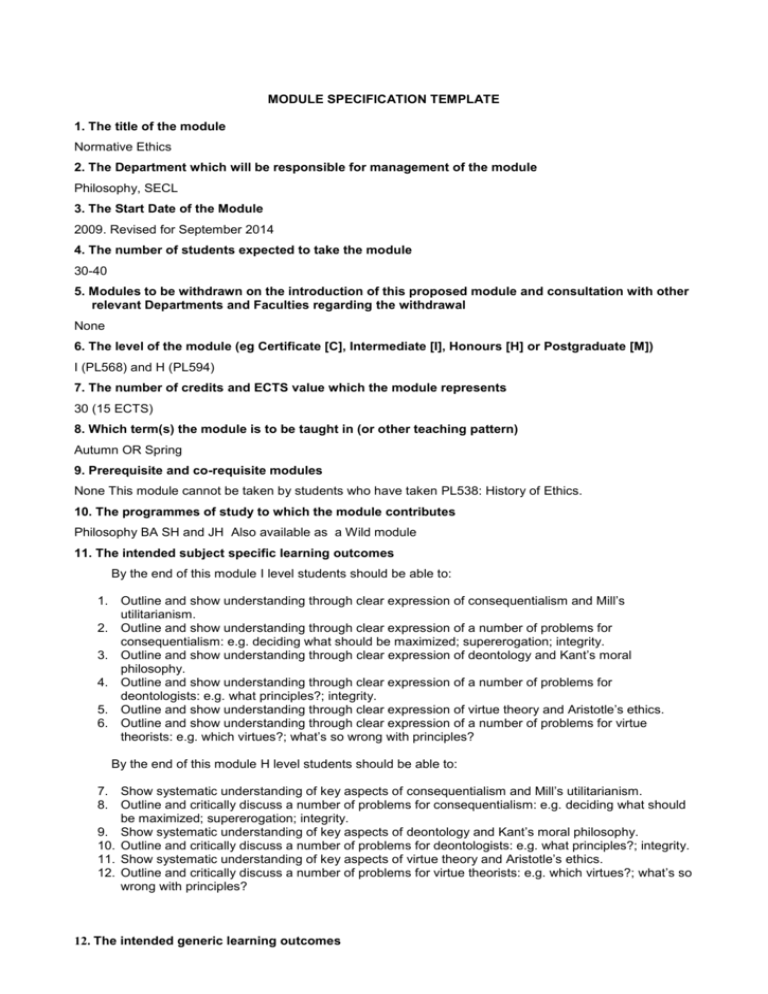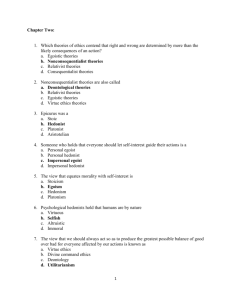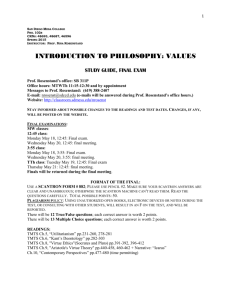Learning Outcomes - University of Kent
advertisement

MODULE SPECIFICATION TEMPLATE 1. The title of the module Normative Ethics 2. The Department which will be responsible for management of the module Philosophy, SECL 3. The Start Date of the Module 2009. Revised for September 2014 4. The number of students expected to take the module 30-40 5. Modules to be withdrawn on the introduction of this proposed module and consultation with other relevant Departments and Faculties regarding the withdrawal None 6. The level of the module (eg Certificate [C], Intermediate [I], Honours [H] or Postgraduate [M]) I (PL568) and H (PL594) 7. The number of credits and ECTS value which the module represents 30 (15 ECTS) 8. Which term(s) the module is to be taught in (or other teaching pattern) Autumn OR Spring 9. Prerequisite and co-requisite modules None This module cannot be taken by students who have taken PL538: History of Ethics. 10. The programmes of study to which the module contributes Philosophy BA SH and JH Also available as a Wild module 11. The intended subject specific learning outcomes By the end of this module I level students should be able to: 1. Outline and show understanding through clear expression of consequentialism and Mill’s utilitarianism. 2. Outline and show understanding through clear expression of a number of problems for consequentialism: e.g. deciding what should be maximized; supererogation; integrity. 3. Outline and show understanding through clear expression of deontology and Kant’s moral philosophy. 4. Outline and show understanding through clear expression of a number of problems for deontologists: e.g. what principles?; integrity. 5. Outline and show understanding through clear expression of virtue theory and Aristotle’s ethics. 6. Outline and show understanding through clear expression of a number of problems for virtue theorists: e.g. which virtues?; what’s so wrong with principles? By the end of this module H level students should be able to: 7. Show systematic understanding of key aspects of consequentialism and Mill’s utilitarianism. 8. Outline and critically discuss a number of problems for consequentialism: e.g. deciding what should be maximized; supererogation; integrity. 9. Show systematic understanding of key aspects of deontology and Kant’s moral philosophy. 10. Outline and critically discuss a number of problems for deontologists: e.g. what principles?; integrity. 11. Show systematic understanding of key aspects of virtue theory and Aristotle’s ethics. 12. Outline and critically discuss a number of problems for virtue theorists: e.g. which virtues?; what’s so wrong with principles? 12. The intended generic learning outcomes By the end of the course I level students should: 1. have developed their skills in critical analysis and argument through an engagement with these issues, both through their reading and through listening to others 2. have developed their ability to make complex ideas clearly understandable in their philosophical writing 3. have developed their ability to make complex ideas clearly understandable in their public speaking 4. have developed their ability to work autonomously and to take responsibility for their learning By the end of the course H level students should: 5. have maintained and enhanced their skills in critical analysis and argument through an engagement with these issues, both through their reading and through listening to others 6. have deepened their ability to make complex ideas clearly understandable in their philosophical writing 7. have deepened their ability to make complex ideas clearly understandable in their public speaking 8. be confident in their ability to work autonomously and to take responsibility for their learning 13. A synopsis of the curriculum This course is designed to introduce students to a number of approaches in what is often referred to as “normative ethics”. We face and hear about moral problems every day. These problems range from life and death matters concerning abortion, euthanasia and the like to other types of case such as whether to tell a lie to prevent hurting someone’s feelings. At some point we might wonder whether there is a set of rules or principles (such as ‘Do not lie’) which will help us through these tricky problems; we might wonder whether there is something more simple underlying all of this ‘ethical mess’ that we can discern. Normative ethics contains a number of theories that attempt to give us such principles and to sort out the mess. In particular, different normative ethical theories are attempts to articulate reasons why a certain course of action is ethically best; they are attempts to say what types of feature we should concentrate on when thinking about ethical problems and why it is that such features are features which have ‘intrinsic moral significance’. Of course, ethical theories do not exist in a vacuum. As we shall see, our everyday intuitions about what is morally best are both the origin of normative ethical theories and the origin of thoughts raised against them. In all of this, the course will be examining these theories by starting with their historical roots, particularly focussing on the work of J. S. Mill, Immanuel Kant and Aristotle. 14. Indicative Reading List General Three Methods of Ethics by Baron, Pettit and Slote Normative Ethics by Shelly Kagan Ethical Theory II (ed.) James Rachels Utilitarianism and Consequentialism Utilitarianism by J. S. Mill Utilitarianism by Geoffrey Scarre Consequentialism and its Critics (ed.) Samuel Scheffler Kant and Deontology The Groundwork of the Metaphysics of Morals by Immanuel Kant An Introduction to Kant’s Ethics by Roger Sullivan Deontology (ed.) Stephen Darwall Virtue Ethics Nicomachean Ethics by Aristotle On Virtue Ethics by Rosalind Hursthouse Virtue Ethics by Christine Swanton 15. Learning and Teaching Methods, including the nature and number of contact hours and the total study hours which will be expected of students, and how these relate to achievement of the intended learning outcomes Lectures: One 2 hour lecture for 10 weeks – 20 hours Seminars: One 1 hour seminar for 10 weeks – 10 hours Total contact hours – 30 hours Total study hours – 300 hours The lecture will satisfy learning outcomes: 11.1-12 and 12.1&5 The seminar will satisfy learning outcomes: 11.1-12 and 12.1-8 16. Assessment methods and how these relate to testing achievement of the intended learning outcomes 100% coursework Assessment Methods: (A) Essay –1500 words – on a topic concerning utilitarian or consequentialist ethics (30%) (B) Essay –1500 words – on a topic concerning Kantian ethics (30%) (C) Essay – 1500 words – on a topic concerning Aristotelian or virtue ethics (30%) (D) Seminar Performance – (10%) Aside from the extra words and the slight difference in their respective (A)s and (B)s, I level and H level students will be given questions that are appropriate to their level in order to distinguish them and assess their respective learning outcomes. Typically, H students will be (a) set questions on more demanding topics, and/or (b) set questions that are the same as those set for I students but which in addition ask them to make explicit and sustained reference to sources appropriate to study at a higher level. Learning Outcomes The essays will test learning outcomes 11.1-12 and 12.1,2,4,5,6,8 Seminar performance will test learning outcomes 11.1-12 And 12.3,4,7,8 17. Implications for learning resources, including staff, library, IT and space None 18. The School recognises and has embedded the expectations of current disability equality legislation, and supports students with a declared disability or special educational need in its teaching. Within this module we will make reasonable adjustments wherever necessary, including additional or substitute materials, teaching modes or assessment methods for students who have declared and discussed their learning support needs. Arrangements for students with declared disabilities will be made on an individual basis, in consultation with the University’s disability/dyslexia support service, and specialist support will be provided where needed. 19. Campus(es) where module will be delivered: Canterbury









